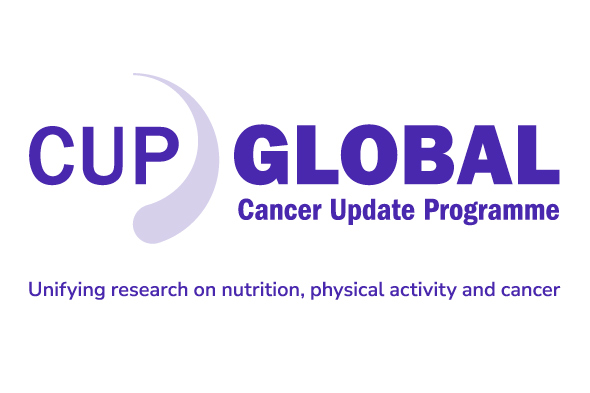About the Global Cancer Update Programme
World Cancer Research Fund International’s Global Cancer Update Programme analyses global research on how diet, nutrition and physical activity affect cancer risk and survival.

On this page
The Global Cancer Update Programme (CUP Global), our flagship portfolio of research, was originally established as the Continuous Update Project (CUP). The work undertaken within the CUP informed the development of our groundbreaking Second and Third Expert Reports.
CUP Global is a rigorous systematic research programme to gather, analyse and judge the global research on how diet, nutrition, physical activity and body weight affect cancer risk and survival.
It’s produced by World Cancer Research Fund International (WCRF International) in partnership with American Institute for Cancer Research (AICR), World Cancer Research Fund in the UK (WCRF) and Wereld Kanker Onderzoek Fonds (WKOF) in the Netherlands.

Evidence for our Recommendations
Our groundbreaking Diet and Cancer Report in 2018 analysed thousands of studies to come to our conclusions
Experts we work with
Many world-renowned experts contribute to CUP Global. An expert panel evaluates the strength of the evidence from systematic reviews, develops guidance and recommendations, makes recommendations for future research and provides input on the direction of the work.
Topic-specific expertise for key areas of work is provided via expert committees.
Additional expertise is provided via formal observers to the panel, representing key organisations in the field (World Health Organization, International Agency for Research on Cancer, National Cancer Institute and Union for International Cancer Control).
One-of-a-kind resource
Imperial College, London and other collaborators continue to add the most up-to-date published and peer-reviewed literature to our unique CUP Global database. The database is the only one like it in the world and now contains over 12,000 publications, with this number continually growing.
Through CUP Global we are able to bring together all the research related to the associations between diet, nutrition, physical activity, body weight, and cancer incidence and survival. This evidence is then used to draw the conclusions that inform our Cancer Prevention Recommendations.
Over 140 scientists from countries around the world have contributed to updating the evidence reviews. As new research is produced and published, it will be added to the database. It’s the only authoritative scientific resource of its kind, trusted globally by oncology experts, researchers, health professionals, policy makers, and the public.
We have begun to work with a wider set of collaborators across the globe in order to strengthen the evidence-base related to other novel modifiable risk factors and cancer incidence. This includes undertaking reviews in new areas of investigation, such as how exposures in childhood and early life might impact cancer risk in adulthood.
Historically, WCRF has not undertaken research to explore the mechanisms that underpin the associations found within population-based research – but this has changed with our new collaboration with IARC.
The results of all these new areas of investigation combine with our ongoing CUP Global work to ensure that our Recommendations are based on the latest evidence from diverse sources.
Evidence from CUP Global also enables WCRF to publish reports on individual site-specific cancers. Where the evidence produces strong results, we can then use this to update our Cancer Prevention Recommendations.
In the future, we plan to expand these recommendations to include site-specific cancer recommendations, as well as more specific guidance and recommendations for those living with and beyond a cancer diagnosis and those treating them.
Key aims
The 7 key aims of our flagship programme of research within CUP Global are, as follows
![]() The development of population or disease-specific guidance and recommendations – for specific stages of life (eg children, young adults, older adults), specific populations (eg childhood and adult cancer survivors), and specific cancer subtypes (eg ER, PR positive and triple-negative breast cancer, Lynch syndrome, colon or uterine cancer vs sporadic).
The development of population or disease-specific guidance and recommendations – for specific stages of life (eg children, young adults, older adults), specific populations (eg childhood and adult cancer survivors), and specific cancer subtypes (eg ER, PR positive and triple-negative breast cancer, Lynch syndrome, colon or uterine cancer vs sporadic).
![]() Clarification of existing knowledge to develop greater understanding of cancer prevention and survivorship – eg the role and impact of specific dietary patterns, the biological mechanisms that cause or prevent cancer.
Clarification of existing knowledge to develop greater understanding of cancer prevention and survivorship – eg the role and impact of specific dietary patterns, the biological mechanisms that cause or prevent cancer.
![]() Efficient and targeted approaches and keeping the evidence current – eg through the application of automated approaches and analytical tools, and the use of a dedicated scanning exercise and data prioritisation (including rapid reviews) to target or trigger an evidence update.
Efficient and targeted approaches and keeping the evidence current – eg through the application of automated approaches and analytical tools, and the use of a dedicated scanning exercise and data prioritisation (including rapid reviews) to target or trigger an evidence update.
![]() Collaborations and input from experts and external stakeholders – utilising experts from across the world, as well as continuing to work in collaboration with the team at Imperial College London.
Collaborations and input from experts and external stakeholders – utilising experts from across the world, as well as continuing to work in collaboration with the team at Imperial College London.
![]() Varied and targeted outputs – to enable greater reach and scope within the scientific community (through academic papers), as well as targeted communications for other audiences (including dissemination events).
Varied and targeted outputs – to enable greater reach and scope within the scientific community (through academic papers), as well as targeted communications for other audiences (including dissemination events).
![]() Globally representative research – most epidemiological studies are conducted in high-income countries, such as those in Europe, the US and Australia, with limited or no data from other countries, especially low- and middle-income countries. Cancer incidence and prevalence vary considerably according to geographical region, making the case for future CUP Global studies to address the limited data from low- and middle-income countries.
Globally representative research – most epidemiological studies are conducted in high-income countries, such as those in Europe, the US and Australia, with limited or no data from other countries, especially low- and middle-income countries. Cancer incidence and prevalence vary considerably according to geographical region, making the case for future CUP Global studies to address the limited data from low- and middle-income countries.
![]() Strong public involvement – we recognise the importance of user involvement at all stages of the work, from identifying research priorities, promoting involvement in funded research and selecting successful research funding applications, to making recommendations and disseminating findings.
Strong public involvement – we recognise the importance of user involvement at all stages of the work, from identifying research priorities, promoting involvement in funded research and selecting successful research funding applications, to making recommendations and disseminating findings.